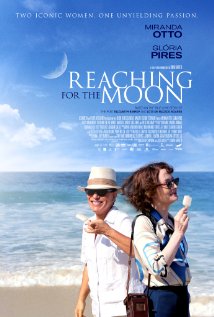
Genres: Biography, Drama and Romance
Releasing Date: 16 August 2013 (USA)
Director: Bruno Barreto
Writers: Matthew Chapman and Julie Sayres
Stars: Tracy Middendorf, Miranda Otto and Gloria Pires
Language: English
Film of the Brazilian Bruno Barreto, concluded just a week before preview in the Panorama section,Flores raras (Reaching for the Moon) tells a true story and is inspired by the book (almost) the same name Flores Raras and Banalissimas of Carmen Lucia de Oliveira. It’s set in Brazil, in the fifties / sixties of the last century, and is a portrait of three women realized and love is the story of a love triangle and its delicate balance.
New York, Central Park, 1951. The poet Elizabeth Bishop (Miranda Otto) sits on a bench with his friend and mentor, Robert Lowell, is in search of inspiration for his work and his friend convinces her to leave: a change of scenery that will make them well. He travels well in Rio de Janeiro to visit Mary Morse (Tracy Middendorff), a friend from college, who now lives in a beautiful villa designed by his partner, the architect Lota de Macedo Soares (Gloria Pires).
Elisabeth has not intend to stay long, despite Mary do everything possible to resolve differences between the companion and the friend: Elisabeth is hit by direct dell’anfitriona Brazilian ways too, as this is irritated by cold and sophisticated ways of the poet. But after this first moment of aversion, Lota and Elisabeth yield mutual attraction and fall in love.
Mary, still in love, she can not leave Lota, which – machissima – is determined to live with both; Mary buys her son that both Bishop ago and wanted to build on the property a studio / apartment.
The menage a trois proves difficult: Mary is pink with jealousy and remorse that he had lost everything to stand next to Lota, the small but growing with love, Elisabeth took refuge always more alcohol, but at that time living a very productive artistic phase that would soon be crowned with the Pulitzer Prize for poetry; Lota instead immerses himself in the works for the construction of the Flamingo Park of Rio.
Sometime later, the Bishop decides to come back for a year in New York to work at NYU. Lota, who took this bad decision Elisabeth, is consumed in the work (supported by Mary, who is always beside) and has a nervous breakdown.
will be in New York, some time later, that will consume the tragedy – that had already been announced in the first part of the film in a dialogue between Mary and Lota.
The film ends on a bench in Central Park, where the film was started with the Bishop’s poem One Art.
The movie depicts the feelings with sensitivity and roles of the three women, even when they change so sudden and unexpected. Like the ease with which it is lived homosexuality and the fact that the film does not contain moralistic judgments on the family unit rather eccentric or the conservatism of Lota (which supports the coup of 1964 that he established a dictatorship in Brazil).
A Brazilian film, but that could very well be Hollywood: apart from a couple of jokes in Portuguese, all speak perfect American English (agree: Lota has a slight inflection). It is a biopic patina that does not carry any flag: not the political or historical films, and even the rainbow. Literary it is, but only because it is based on the life of a poet, and it is dotted with quotations from his poems, does not contain reflections on the art of writing. If you really were to bring a flag, would put the American

